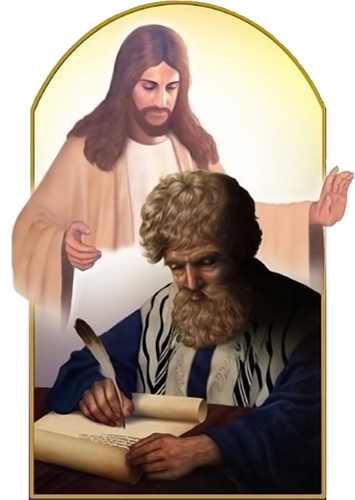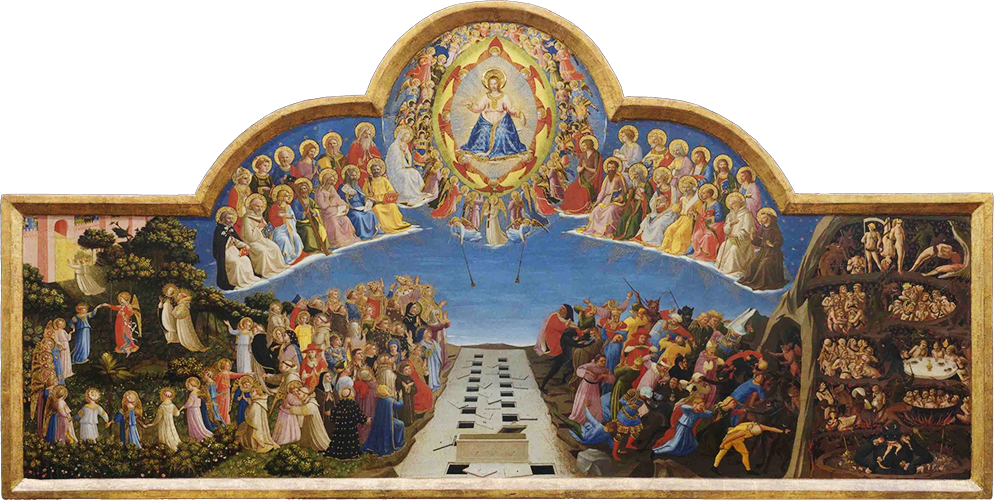31 “When the Son of Man comes in his glory, and all the angels with him, he will sit on his glorious throne. 32 All
the nations will be gathered before him, and he will separate the
people one from another as a shepherd separates the sheep from the
goats. 33 He will put the sheep on his right and the goats on his left. 34 “Then
the King will say to those on his right, ‘Come, you who are blessed by
my Father; take your inheritance, the kingdom prepared for you since
the creation of the world. 35 For
I was hungry and you gave me something to eat, I was thirsty and you
gave me something to drink, I was a stranger and you invited me in, 36 I needed clothes and you clothed me, I was sick and you looked after me, I was in prison and you came to visit me.’ 37 “Then the righteous will answer him, ‘Lord, when did we see you hungry and feed you, or thirsty and give you something to drink? 38 When did we see you a stranger and invite you in, or needing clothes and clothe you? 39 When did we see you sick or in prison and go to visit you?’ 40 “The
King will reply, ‘Truly I tell you, whatever you did for one of the
least of these brothers and sisters of mine, you did for me.’ 41 “Then
he will say to those on his left, ‘Depart from me, you who are cursed,
into the eternal fire prepared for the devil and his angels. 42 For I was hungry and you gave me nothing to eat, I was thirsty and you gave me nothing to drink, 43 I
was a stranger and you did not invite me in, I needed clothes and you
did not clothe me, I was sick and in prison and you did not look after
me.’ 44 “They
also will answer, ‘Lord, when did we see you hungry or thirsty or a
stranger or needing clothes or sick or in prison, and did not help you?’ 45 “He will reply, ‘Truly I tell you, whatever you did not do for one of the least of these, you did not do for me.’ 46 “Then they will go away to eternal punishment, but the righteous to eternal life.” (NIV: Matthew 25:31-46)
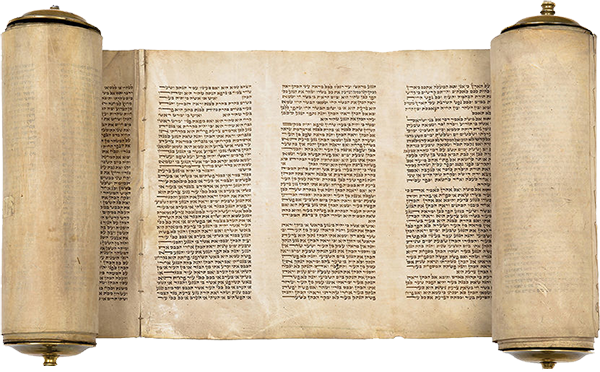
Preserving the Law
Matthew’s Emphasis on Keeping the Commandments
| 17 “Do not think that I have come to abolish the Law or the Prophets; I have not come to abolish them but to fulfill them. 18 For
truly I tell you, until heaven and earth disappear, not the smallest
letter, not the least stroke of a pen, will by any means disappear from
the Law until everything is accomplished. 19 Therefore anyone who sets aside one of the least of these commands
and teaches others accordingly will be called least in the kingdom of
heaven, but whoever practices and teaches these commands will be called
great in the kingdom of heaven. 20 For
I tell you that unless your righteousness surpasses that of the
Pharisees and the teachers of the law, you will certainly not enter the
kingdom of heaven. (NIV: Matthew 5:17-20) |
How does Jesus' statement regarding the Law (i.e. the commandments of the Torah) help
us to place him within the context of Judaism?
Does Jesus' statement imply that Christians must obey all of the commandments
that are presented in the Hebrew Bible (such as keeping kosher,
circumcising males, etc.)?
|
21 “You have heard that our ancestors were told, ‘You must not murder. If you commit murder, you are subject to judgment.’ 22 But I say, if you are even angry with someone, you are subject to judgment! If you call someone an idiot, you are in danger of being brought before the court. And if you curse someone, you are in danger of the fires of hell. 23 “So if you are presenting a sacrifice at the altar in the Temple and you suddenly remember that someone has something against you, 24 leave your sacrifice there at the altar. Go and be reconciled to that person. Then come and offer your sacrifice to God. 27 “You have heard the commandment that says, ‘You must not commit adultery.’ 28 But I say, anyone who even looks at a woman with lust has already committed adultery with her in his heart. 29 So if your eye — even your good eye — causes
you to lust, gouge it out and throw it away. It is better for you to
lose one part of your body than for your whole body to be thrown into
hell. 30 And if your hand — even your stronger hand — causes
you to sin, cut it off and throw it away. It is better for you to lose
one part of your body than for your whole body to be thrown into hell. 38 “You have heard the law that says the punishment must match the injury: ‘An eye for an eye, and a tooth for a tooth.’ 39 But I say, do not resist an evil person! If someone slaps you on the right cheek, offer the other cheek also. 40 If you are sued in court and your shirt is taken from you, give your coat, too. 41 If a soldier demands that you carry his gear for a mile, carry it two miles. 42 Give to those who ask, and don’t turn away from those who want to borrow. 43 “You have heard the law that says, ‘Love your neighbor’ and hate your enemy. 44 But I say, love your enemies! Pray for those who persecute you! 45 In
that way, you will be acting as true children of your Father in heaven.
For he gives his sunlight to both the evil and the good, and he sends
rain on the just and the unjust alike. 46 If you love only those who love you, what reward is there for that? Even corrupt tax collectors do that much. 47 If you are kind only to your friends, how are you different from anyone else? Even pagans do that. 48 But you are to be perfect, even as your Father in heaven is perfect. (NLT: Matthew 5:21-45)
|
What do these examples tell us about what "fulfilling the law" meant to Matthew?
|
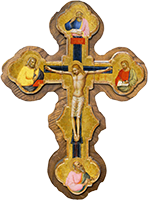
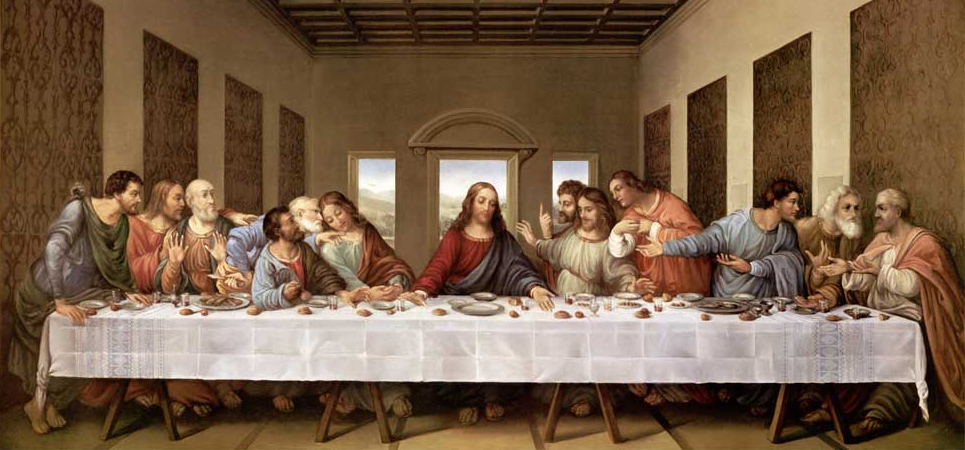
|
|
12 On
the first day of the Festival of Unleavened Bread, when the Passover
lamb is sacrificed, Jesus’ disciples asked him, “Where do you want us to
go to prepare the Passover meal for you?” 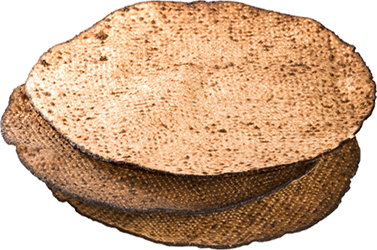
13 So Jesus sent two of them into Jerusalem with these instructions: “As you go into the city, a man carrying a pitcher of water will meet you. Follow him. 14 At
the house he enters, say to the owner, ‘The Teacher asks: Where is the
guest room where I can eat the Passover meal with my disciples?’ 15 He will take you upstairs to a large room that is already set up. That is where you should prepare our meal.” 16 So the two disciples went into the city and found everything just as Jesus had said, and they prepared the Passover meal there.
17 In the evening Jesus arrived with the Twelve. 18 As they were at the table eating, Jesus said, “I tell you the truth, one of you eating with me here will betray me.” 19 Greatly distressed, each one asked in turn, “Am I the one?” 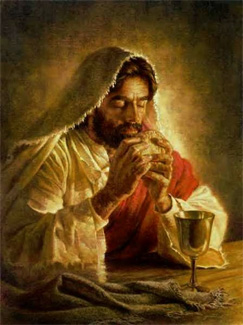 20 He replied, “It is one of you twelve who is eating from this bowl with me. 21 For the Son of Man
must die, as the Scriptures declared long ago. But how terrible it will
be for the one who betrays him. It would be far better for that man if
he had never been born!” 20 He replied, “It is one of you twelve who is eating from this bowl with me. 21 For the Son of Man
must die, as the Scriptures declared long ago. But how terrible it will
be for the one who betrays him. It would be far better for that man if
he had never been born!”
22 As they were eating, Jesus took some bread and blessed it. Then he broke it in pieces and gave it to the disciples, saying, “Take it, for this is my body.” 23 And he took a cup of wine and gave thanks to God for it. He gave it to them, and they all drank from it. 24 And he said to them, “This is my blood, which confirms the covenant between God and his people. It is poured out as a sacrifice for many. 25 I tell you the truth, I will not drink wine again until the day I drink it new in the Kingdom of God.” (NLT: Mark 14:12-25)
What does the "body and blood" of Christ symbolize?
|

|
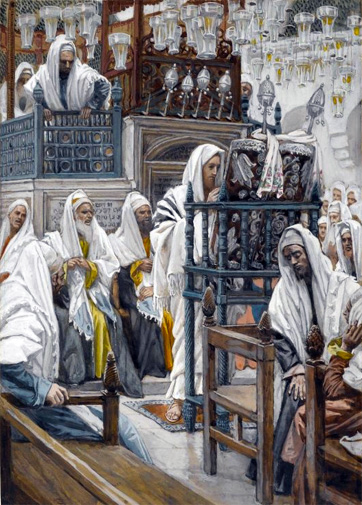
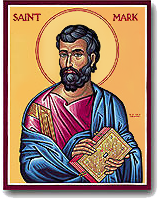 Three of the gospels,
Matthew, Mark, and Luke, are so similar that they are called the
synoptic gospels, referring to the fact that they can be “seen together” as presenting rather similar views of Jesus’ career, though they are organized somewhat
differently. Most historians think that Matthew and Luke are
largely based on Mark and another source called “Q.” This
hypothesized source would probably be a
compilation of oral and written traditions. According to
historical-critical analysis, the author of Mark probably put together
many fragments of oral tradition in order to develop a connected
narrative about Jesus’ life and ministry, for the sake of propagating the faith.
Three of the gospels,
Matthew, Mark, and Luke, are so similar that they are called the
synoptic gospels, referring to the fact that they can be “seen together” as presenting rather similar views of Jesus’ career, though they are organized somewhat
differently. Most historians think that Matthew and Luke are
largely based on Mark and another source called “Q.” This
hypothesized source would probably be a
compilation of oral and written traditions. According to
historical-critical analysis, the author of Mark probably put together
many fragments of oral tradition in order to develop a connected
narrative about Jesus’ life and ministry, for the sake of propagating the faith.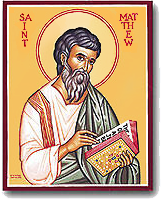 The other two synoptic
gospels often parallel Mark quite closely but include additional
material. The gospel according to
Matthew (named after one of Jesus’ original disciples, a tax collector) is sometimes called a Jewish Christian gospel. It
represents Jesus as a second Moses as well as the Messiah ushering in
the Kingdom of Heaven, with frequent references to the Old Testament. Matthew’s stories emphasize that the Gentiles (non-Jews) accept
Jesus, whereas the Jews reject him as savior.
The other two synoptic
gospels often parallel Mark quite closely but include additional
material. The gospel according to
Matthew (named after one of Jesus’ original disciples, a tax collector) is sometimes called a Jewish Christian gospel. It
represents Jesus as a second Moses as well as the Messiah ushering in
the Kingdom of Heaven, with frequent references to the Old Testament. Matthew’s stories emphasize that the Gentiles (non-Jews) accept
Jesus, whereas the Jews reject him as savior.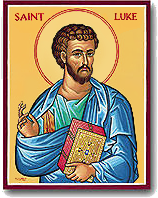 Luke, to whom the third gospel is
attributed, is traditionally thought to have been a physician who
sometimes accompanied Paul the apostle. The
gospel seems to have been written with a Gentile Christian audience in
mind. Luke presents Jesus’ mission in universal rather than exclusively Jewish terms
and accentuates the importance of his ministry to the underprivileged
and lower classes.
Luke, to whom the third gospel is
attributed, is traditionally thought to have been a physician who
sometimes accompanied Paul the apostle. The
gospel seems to have been written with a Gentile Christian audience in
mind. Luke presents Jesus’ mission in universal rather than exclusively Jewish terms
and accentuates the importance of his ministry to the underprivileged
and lower classes.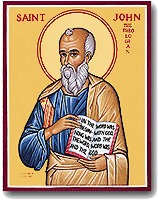 The Gospel of John, traditionally attributed to “the disciple Jesus
loved,” is of a very different nature from the other three. It concerns
itself less with following the life of Jesus than with seeing Jesus as
the eternal Son of God, the word of God made flesh. It is seen by many
scholars as being later in origin than the synoptic gospels, perhaps
having been written around the end of the first century CE. By this
time, there was apparently a more critical conflict between Jews who
believed in Jesus as the Messiah, and the majority of Jews, who did not
recognize him as the Messiah they were awaiting. The Gospel of John
seems to concentrate on confirming Jesus’ Messiahship, and also to
reflect Greek influences , such as a dualistic distinction between
light and darkness. It is also more mystical and devotional in nature
than the synoptic gospels. (Living Religions, 9th Edition, 304)
The Gospel of John, traditionally attributed to “the disciple Jesus
loved,” is of a very different nature from the other three. It concerns
itself less with following the life of Jesus than with seeing Jesus as
the eternal Son of God, the word of God made flesh. It is seen by many
scholars as being later in origin than the synoptic gospels, perhaps
having been written around the end of the first century CE. By this
time, there was apparently a more critical conflict between Jews who
believed in Jesus as the Messiah, and the majority of Jews, who did not
recognize him as the Messiah they were awaiting. The Gospel of John
seems to concentrate on confirming Jesus’ Messiahship, and also to
reflect Greek influences , such as a dualistic distinction between
light and darkness. It is also more mystical and devotional in nature
than the synoptic gospels. (Living Religions, 9th Edition, 304)